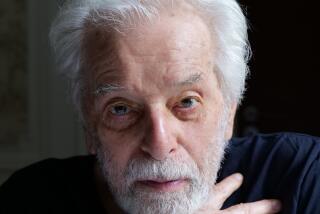In celebration of a Russian master
The Nuartâs âAndre Tarkovsky: A Retrospectiveâ celebrates the work of the greatest Russian filmmaker since Sergei Eisenstein. Tarkovsky, who died of lung cancer at 54 in 1986, was one of the most demanding and uncompromising filmmakers of the modern cinema. His films run long and are virtually devoid of conventional exposition. Yet the worlds into which Tarkovsky plunges us become utterly compelling, and we emerge feeling that we have experienced a revelation, no matter how shrouded in ambiguity.
âAndrei Rublevâ (1966, Friday through Sunday), presented in a new directorâs-cut 35-millimeter print, is a stunning one-of-a-kind masterpiece, an epic of stark, impassioned grandeur and astonishing, almost hallucinatory imagery that traces the spiritual odyssey of an artist-monk. Little is known of him except for what remains of his work, most notably his contributions to the frescoes in Moscowâs Cathedral of Annunciation.
âThe Sacrificeâ (1986, Monday), Tarkovskyâs great meditation on the imperiled future of humanity and arguably the directorâs finest work, is suffused with his characteristic longing for maternal love and for communion with God and nature while it evokes the specter of nuclear holocaust. No other filmmaker has so powerfully evoked a world of the spirit existing beyond surface appearances. At the beginning, âThe Stalkerâ (1980, Tuesday) has the look of shadowy steel engravings and is set in a bleak industrial city in Estonia. Its title character (Alexander Kaidanovsky) is an intense man whose mission in life is to conduct, at great risk and small pay, people into the Zone, a heavily guarded, forbidden area that 20 years earlier had been struck by a meteorite or possibly a UFO. It is said that nature there has been mysteriously transformed; its flowers supposedly no longer smell. But the abandoned region attracts visitors because in it is a room in which oneâs wishes may be granted.
At first, the Zone would seem to symbolize the Free World, but it becomes increasingly clear that Tarkovsky has lots more in mind. The Stalker gradually evolves from a figure of seeming superstitionto a figure of mysticism.
The title of the enigmatic âThe Mirrorâ (1974, Wednesday and Thursday) could easily refer to art itself, in its ancient function of holding up a reflection to nature so that we may see ourselves in it. With Tarkovsky, however, thereâs always a desire to see beyond this world into others -- in this instance, the past, evoked through memory, imagination and dreams.
âThe Mirrorâ is above all an expression of longing for the past, specifically for a motherâs love and a return to an Eden-like existence. But this also is a film with a double vision: While expressing that childhood desire for security that seems to remain with us always, it perceives its people from an adult perspective, and for all its luminosity, some of its memories are fear-laden and tragic. Playing with âThe Mirrorâ is Tarkovskyâs seldom-seen debut feature âIvanâs Childhoodâ (1962).
*
Screenings
What: âAndre Tarkovsky: A Retrospectiveâ
Where: Nuart, 11272 Santa Monica Blvd., West L.A.
When: Friday-next Thursday, 4 and 8:15 p.m.; also 11:45 a.m. on the weekend
Info: (310) 478-6379
More to Read
Only good movies
Get the Indie Focus newsletter, Mark Olsen's weekly guide to the world of cinema.
You may occasionally receive promotional content from the Los Angeles Times.










